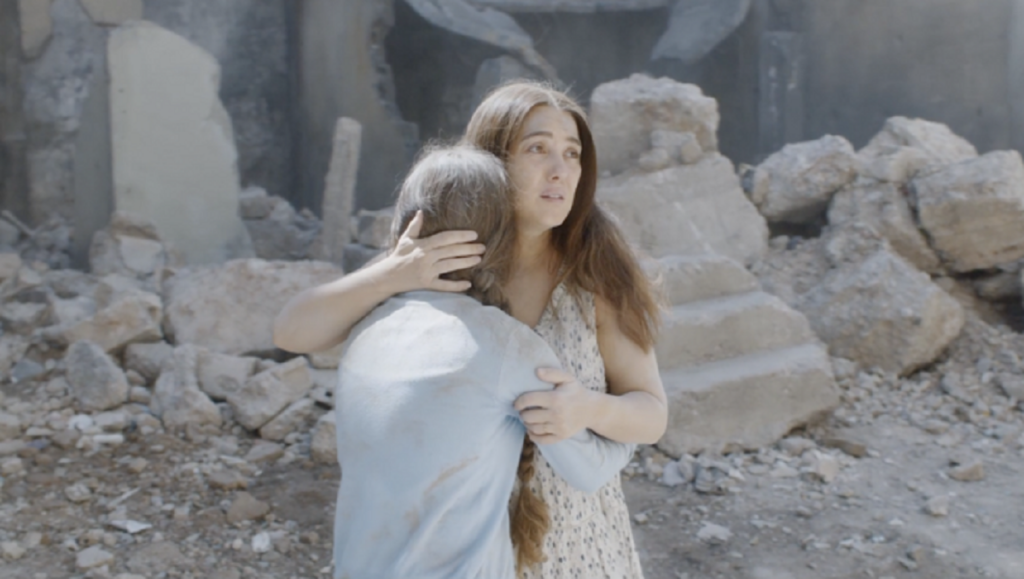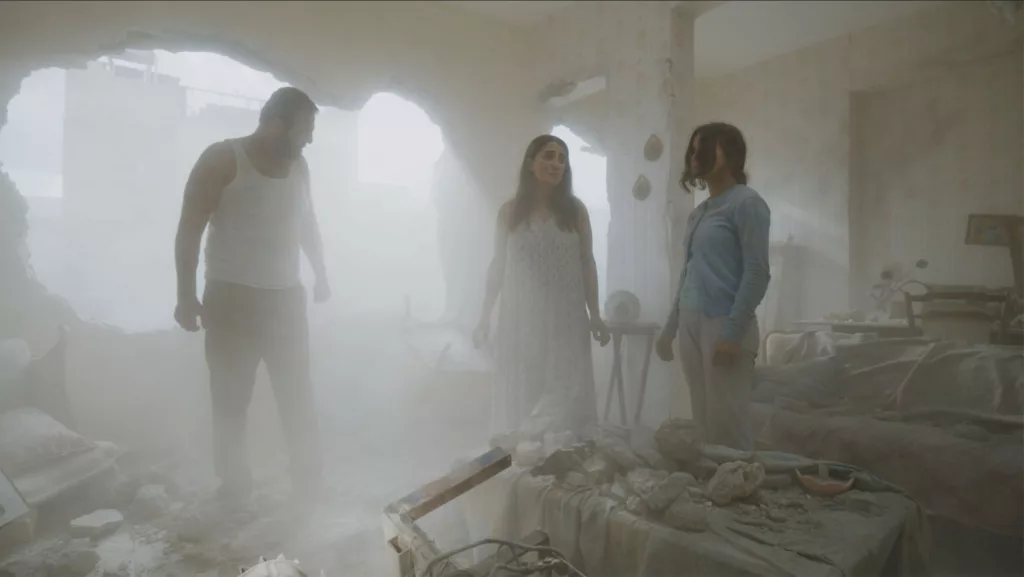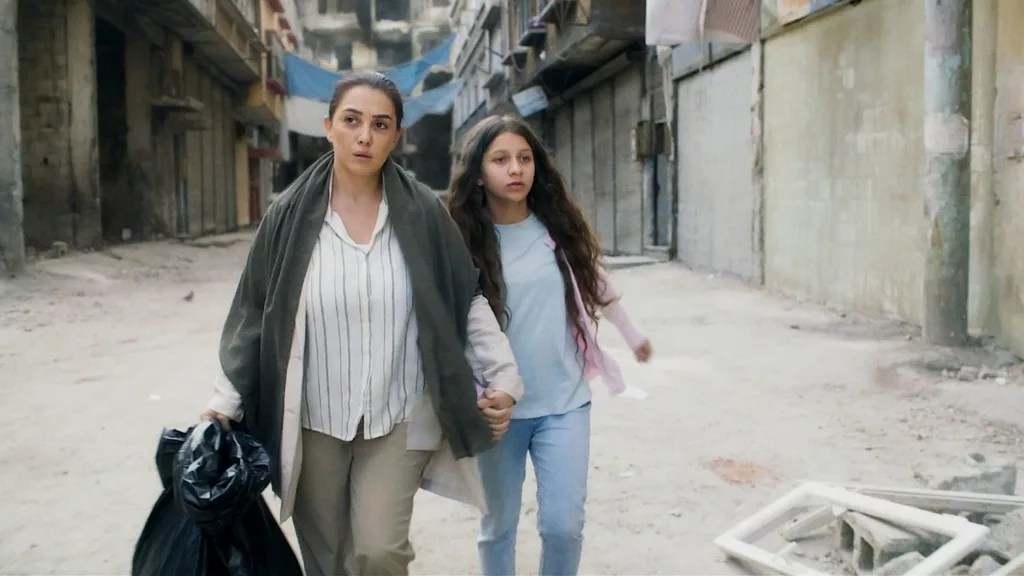Growing up in war-torn Damascus gave Syrian filmmaker Soudade Kaadan a unique perspective to share with the world. In her sophomore feature, Nezouh, she crafts a poignant tale about family, hardship, and humanity’s ability to find hope even in our darkest hours.
The film centers around 14-year-old Zeina, her mother Hala, and her father Motaz, among the few residents who remain in their besieged Damascus neighborhood. Continuous bombardments have left their homes bombed out and damaged, yet Motaz insists on staying put rather than fleeing as refugees. Zeina dreams of escaping Syria’s violence through fanciful daydreams, imagining herself sailing into the sky.
Kaadan blends moments of lyrical magical realism into her otherwise gritty wartime setting. When a bomb blows gaping holes in Zeina’s ceiling and walls, it opens not just her view of the stars but also the possibility of connection with a kind teenage boy in a neighboring apartment. Through their budding friendship and Zeina’s vivid imagination, glimpses of hope and normalcy emerge against the backdrop of suffering.
With Nezouh, Kaadan gives voice to the Syrian people’s resilience and humanity in crisis through her gentle, coming-of-age tale. Enchanting yet unflinchingly real, the film uses magical flourishes to portray how even amid life’s darkest hours, our spirit remains indomitable and dreams keep hope alive.
Finding freedom amid chaos
War ravages the lives of many in Syria, but for one Damascus family, inner personal wars threaten to tear them apart. Zeina struggles to cling to childhood as she comes of age under siege, while parents Hala and Motaz grapple for control in a world where so little can be controlled.
Zeina dreams of escaping the violence through play, imagining fanciful acts like skipping stones across the sky. But the 14-year-old can’t avoid reality for long, as bombings literally blast holes in her home and metaphorically in her innocence. Motaz remains stubbornly resistant to leaving, asserting his authority even as resources dwindle.
Hala knows the danger they face if they remain in the city. She married young and now questions if staying is truly best for Zeina. A deep history lies between Hala and Motaz, but the power balance of their relationship faces new stresses as Hala’s protective mothering instincts clash with Motaz’s pride.
When Motaz proposes marrying Zeina without her consent, it sparks an eruption of the long-simmering tensions. Mother and daughter flee together into the chaos of bombed-out streets, seeking escape yet unsure what danger they rush towards.
Amid the violence dismantling her city and family, Zeina dreams of a future beyond war. A hole blasted in her home paradoxically offers new possibility through Amer, a teenage friend representing hope for connection in an isolated world. For Zeina, the path to womanhood will require navigating not just war but the personal battles shaking her family’s foundations.
Finding Refuge in Ruins
The war has left its savage mark on the home of Zeina and her family. Yet even amid rubble and holes blasted in walls, Soudade Kaadan’s Nezouh finds fleeting moments of beauty and escape.
The apartment emerges as another character in the film. Weathered patterns adorning shattered walls speak of former lives. Filmed with intimacy, it stands stark yet dignified—one family refusing to let violence claim the last shreds of normalcy.
Light itself transforms the space. Entering through new gaps exposes shadows where there was once privacy. But beams also ignite flecks of drifting dust, gilding survivors who huddle within surviving frames. Through a lens sensitive to luminosity in even dilapidated corners, Nezouh locates humanity’s perseverance against the darkness without and within.
Shots framed within windows peeking from massacred facades peer beyond at a city under siege yet noting persevering signs of life. Compositions shot from unexpected perspectives, like chasms in the ceiling, conjure the jarring reality that safety offers no guarantees. Yet they also birth improbable connections through Amer’s visits through this new portal.
The most stirring are images where magic seeps into mundane moments. Zeina’s dreaming as she skips stones across the sky evokes childhood’s resilience, finding fantasies where fear haunts adults. Later, bouncing beams reflect her mother, gaining solace in reflection.
Nezouh shows how imagination, like these luminous vignettes, keeps hope alive in desperation’s depths. If outside war shatters, inside the mind and spirit remain beyond destruction’s grasp through visions lighting our dark nights with stars within reach.
Everyday Acts of Resistance
Set within a war-torn Syrian home, Nezouh explores how ordinary people persevere amid conflict and hold fast to small comforts. From Motaz’s stubborn insistence on staying to Zeina’s vibrant imagination, the film reveals the quiet acts of resisting forces that would upend their lives.
Bombings have left the family’s apartment damaged yet lively as neighbors call for support across rubble. Motaz works tirelessly to keep basic systems running and normalcy intact; denying damage is serious. His resistance stems partly from pride but also from a will to shield his family from further hardship.
Hala and her daughter Zeina find different forms of escape. When a bomb opens Zeina’s ceiling to the sky, it becomes a portal for dreaming. She skims stones on clouds and fishes among stars, transporting herself through flights of fantasy. Even simple moments like sharing berries with Amer take on magic thanks to love blossoming in bleak times.
Hala eventually resists pressure to continuously displace herself as a refugee, rejecting the instability and loss of community such a maneuver demands. Both women defy expectations to claim autonomy over their fates, deciding whether leaving or staying better secures Zeina’s future.
Throughout, Kaadan’s subtle blend of realism and imagination shines light on humanity’s incredible capacity to find hope even in despair. The film celebrates resilience as ordinary as Motaz’s cobbling repairs or as profound as a mother and daughter refusing to let outside forces dictate their lives. In resisting the dehumanizing effects war imposes and clinging to intimacy despite bombs encroaching, Nezouh’s characters demonstrate how small acts of courage can transcend political violence with beauty, care, and a vision of a better day.
Hidden Depths
Nezouh boasts impressive debut performances that bring its complex characters to life. Hala Zein subtly captures teenager Zeina’s spirited spirit, tempered by early signs of maturity forced by war. Kinda Alloush equally shines as Hala grappling with motherhood in a crumbling world.
Zeina dreams of simpler times, yet she displays resilience beyond her years when reality intrudes. From secret hopes for love to recognizing tough choices must be made, Zeina’s journey feels authentic. Alloush, meanwhile, portrays Hala’s care for family against a will to fight for her daughter’s future, however unsafe the alternative may seem. Their bond feels genuine, with each character retaining believable inner depths.
Samer Al Masri delivers Motaz as a man striving to maintain control even as it slips away. Underneath surface frustration lies care for loved ones and guilt over failing provider duties. Al Masri fleshes Motaz out as more than a stubborn caricature, letting us appreciate what drives him as the story progresses.
Supporting actors also make impressions. Nizar Alani infuses Amer with gentle enthusiasm, providing hope alongside realism about the individuals affected. Even minor characters feel fully realized with their own desires, flaws, and shining moments that collectively give Nezouh’s world texture and heart.
Kaadan’s debut cast excels at expressing complex emotional journeys, whether conveying care, fear, or devotion amid a backdrop that could reduce some to stock types. Their nuanced portrayals instead lend Nezouh’s themes empathy and truth, a testament to newcomers tapping rich inner lives born from difficult circumstances.
Impressive Debut
Soudade Kaadan displays assured control for a debut feature filmmaker. Nezouh conveys relatable characters amid harrowing circumstances through deft directing. Scenes feel authentic yet infused with heart.
Kaadan also writes cohesively, blending realism with magic. The damaged home becomes a dreamscape portal, yet grounded familial tensions remain. Zeina’s plight resonates while magical elements uplift. This mix adds nuance, avoiding a solely bleak war portrait.
Nezouh elevates further through stellar technical attributes. Cinematographer Hélène Louvart lends intimacy to cramped quarters and brightness to fantastical moments through lighting. Production design beautifully renders a family’s makeshift coping. Their bomb-struck apartment emerges as a symbol of resilience through meticulous yet understated work.
The editing and soundtrack also enhance the film. Paced sequences flow naturally from real to ethereal. The score rises when needed most. These components immerse the audience without distraction.
Kaadan establishes herself as a director who brings out nuanced performances from her cast despite their lack of experience. Her team likewise rises to challenges, telling an impactful Syrian story through their impressive collaborative efforts. For a debut feature in such trying circumstances, Nezouh rises above through Kaadan’s command and contributions from gifted technical talent committed to showcasing life’s persistence of spirit.
A Resonant Story of Survival
Nezouh tells a poignant story with relevance. As war rages outside, Kaadan focuses on the intimate struggles within one family. She emphasizes our shared humanity, even in the most brutal of conflicts.
The film succeeds as both a war drama and a coming-of-age tale. Against the horrors of violence enveloping their city, it follows Zeina’s journey into womanhood amid familial tension. Yet her imagination retains hope through magical glimpses of freedom. This balance highlights resilience without ignoring real trauma.
Kaadan’s stylistic choices prove effective. Mixing realism and fantasy underscores Zeina’s perspective and the difficulties of retaining innocence in dire straits. Visual poetry amid the ruins comments on piecing life back together regardless of circumstance.
While not perfect, Kaadan’s direction shows empathy and skill in handling sensitive material. Her nuanced portrayal resonates by uplifting small moments of connection. Even through extreme divides, our shared hopes and hardships remain.
With two impressive features already, Kaadan proves a vital new Syrian voice. By bringing intimate stories from her homeland to international audiences, she reminds us of our collective humanity. Nezouh stays with viewers not only for its aesthetics but also for affirming spirit in the face of suffering. Kaadan is an artist to watch as she continues to share resonant tales of survival.
The Review
Nezouh
With compassionate direction and finely realized stylistic choices, Nezouh crafts an impactful portrait of ordinary lives persevering amid war. Kaadan handles delicate subject matter with empathy, prioritizing glimpses of shared humanity over spectacle. While not perfect in execution, the film resonates through its hopeful messaging and affirms the indomitable human spirit.
PROS
- Sensitively portrays family tensions and a young woman's coming of age amid conflict
- Balances realism with magical elements to emphasize resilience through imagination
- Beautiful cinematography enhances emotional moments and visual poetry
- Addresses the trauma of war while maintaining an optimistic spirit
CONS
- Some of the of the characterization feels overly simplistic
- Narrative pacing is uneven at times
- Fantasy elements are not entirely convincing






















































Discussion about this post